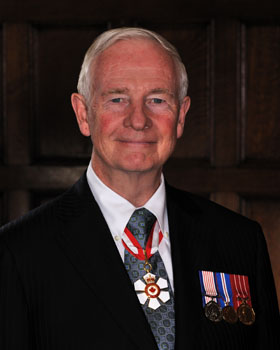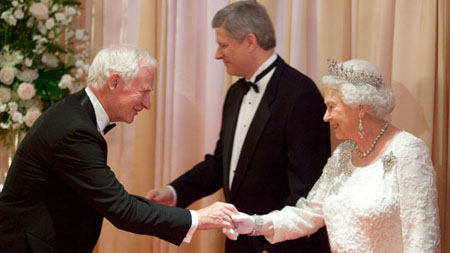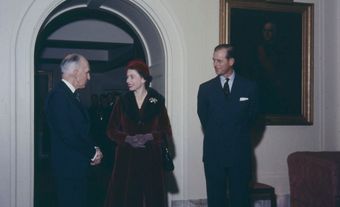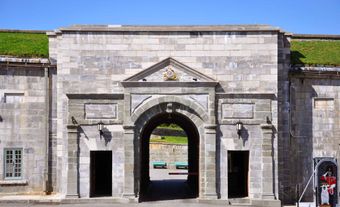
Early Life, Education and Hockey
The son of a hardware store owner, David Johnston was born in Copper Cliff, Ontario, a mining town outside of Sudbury, and raised in Sault Ste. Marie, Ontario. In 1959, he earned a scholarship to Harvard University, where he played defence on the hockey team. Though physically small, he became known for his determination and competitiveness. As one teammate recalled, “David would catch the puck in his teeth to stop it going into the net.” Johnston was awarded the John Tudor Memorial Cup as the most valuable player in 1962–63 and was twice named to the all-American hockey team. In 1988, he was inducted into the Harvard Varsity Club’s Hall of Fame. At Harvard, Johnston befriended writer Erich Segal. In Segal’s bestselling 1970 novel, Love Story, the captain of the Harvard hockey team is Davey Johnston, a character named after the future governor general.
Johnston graduated in 1963 with a bachelor’s degree in government and international relations. He turned down an opportunity to try out for the Boston Bruins because he believed he was not big enough or strong enough to play in the National Hockey League (NHL). Instead, he went on to study law on scholarship at Cambridge University and Queen’s University and received bachelor of law degrees from both institutions.
Academic Career
Johnston had a long and distinguished academic career. After teaching law at Queen’s University and the University of Toronto, he became dean of law at the University of Western Ontario. At the age of 37, he became principal of McGill University, where he served from 1979 to 1994 and gained a reputation as both an energetic administrator and a skilled fundraiser. In 1999, he was appointed president of the University of Waterloo, where he served until 2010. Throughout his academic career, he continued to be an active researcher and writer, publishing several books on corporate law, securities regulation and information technology law. He received honorary doctorates from more than a dozen universities.
Johnston was highly active outside the university. He moderated the televised leaders’ debates during the 1979 and 1984 federal elections, the 1985 Québec provincial election and the 1987 Ontario provincial election. In the 1990s, he hosted two current-events talk shows, The Editors and The World in Review, which aired on CBC Newsworld in Canada and PBS in the United States. He also served on the boards of several major corporations, including Canada Trust, Seagram’s, Southam Brands Incorporated and Dominion Textiles.
Government Advisor
Diplomatic and discreet, Johnston was frequently called upon by both Liberal and Conservative governments to chair committees charged with making recommendations on difficult issues, including the National Round Table on the Environment and the Economy, the federal Information Highway Advisory Council, the National Task Force on High Speed Broadband Access and the federal Blue Ribbon Panel on Smart Communities.
In 2007, Prime Minister Stephen Harper announced Johnston as special advisor and asked him to draft terms of reference for a public inquiry into the relationship between former prime minister Brian Mulroney and German-Canadian businessman Karlheinz Schreiber. (After stepping down as prime minister, Mulroney had accepted between $225,000 and $300,000 in cash from Schreiber, who had once been a lobbyist for Airbus.) Controversially, Johnston recommended a narrow scope for what became the Oliphant Commission. The commission could look into Schreiber’s 1993 and 1994 payments to Mulroney but not the purchase of Airbus aircraft by government-owned Air Canada while Mulroney was prime minister — an issue that the RCMP had already investigated.

Governor General of Canada
Johnston was named Canada’s 28th governor general on 8 July 2010, an appointment that was widely praised. He took office on 1 October 2010, replacing Michaëlle Jean.
Jean had dealt with a constitutional controversy when she prorogued Parliament at the request of Prime Minister Stephen Harper, whose government was trying to avoid defeat in Parliament. Many commentators expected that Johnston would face similar challenges because tensions were high in the House of Commons, where none of the parties held a majority at the time. His legal expertise was expected to be of considerable use, but the predictions were not borne out: during his tenure, he faced no political or constitutional crises.
Johnston’s focus as governor general was to foster “a smarter, more caring nation.” He honoured those who had given their time to worthy causes and introduced the Sovereign’s Medal for Volunteers to replace the Caring Canadian Award. He created the Rideau Hall Foundation, a charity that works with the governor general to foster leadership, education, philanthropy and innovation. Johnston also hosted the annual Killam Prize Symposium, where leading academics discuss critical issues. To develop young thinkers, entrepreneurs and leaders, he helped create the Canadian Queen Elizabeth II Diamond Jubilee Scholarships. He also encouraged Canadians to develop an innovation agenda and travelled abroad to promote Canada as a research and innovation centre.
Johnston sought to increase public awareness of Indigenous issues and strengthen the relationship between Indigenous peoples and the Crown. He met with First Nations chiefs, Indigenous youth leaders and Idle No More protestors and hosted the 2015 closing ceremonies of the Truth and Reconciliation Commission of Canada.
Throughout his time, Johnston was careful to never step into the government’s domain. In 2012, he refused to meet with Attawapiskat First Nation chief Theresa Spence, who had gone on a hunger strike until both Johnston and Harper agreed to meet with her. Spence wanted to discuss treaties between Canada and Indigenous peoples, but Johnston explained publicly that those matters were the responsibility of elected officials.
In 2016, Johnston published The Idea of Canada: Letters to a Nation, a bestselling book of letters to individual Canadians. The letters deal with diverse topics, including hockey, education and innovation, and reflect Johnston’s wide range of interests, but they all speak to one theme: the character of Canada.
Personal Life
Family has been central to Johnston’s life. In 1964, he married Sharon Downey, whom he had known since elementary school in Sault Ste. Marie. In subsequent years, she completed a PhD in respiratory physiology, ran a horse farm and wrote a novel. The couple have five daughters and many grandchildren. Because of Johnston’s love of reading, his grandchildren call him “Grandpa Book.”

 Share on Facebook
Share on Facebook Share on X
Share on X Share by Email
Share by Email Share on Google Classroom
Share on Google Classroom

